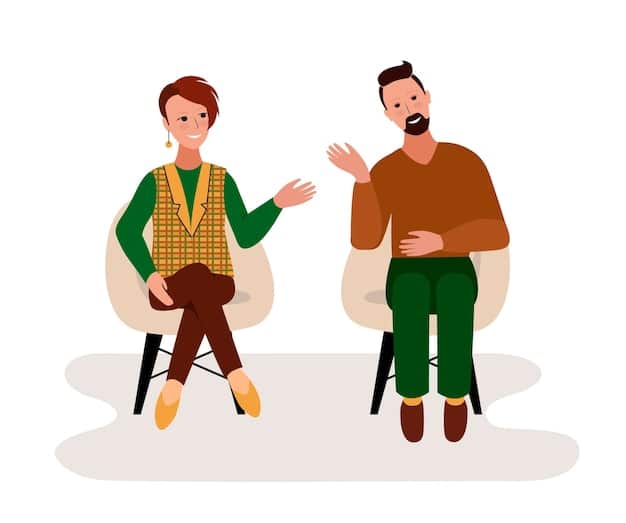Transform Your Relationships: Simple Strategies for Stronger Connections

Anúncios
Transform Your Relationships: Simple Strategies for Building Stronger Connections explores actionable techniques, from enhancing communication to practicing empathy, for fostering deeper and more meaningful bonds in all areas of your life.
Do you ever wonder how to truly connect with the people around you? Building and maintaining strong relationships is crucial for a happy and fulfilling life. This article delves into transform your relationships: simple strategies for building stronger connections, offering practical tips and actionable advice to deepen your bonds with family, friends, and romantic partners.
Anúncios
Understand the Foundations of Strong Relationships
Strong relationships aren’t built overnight; they require a solid foundation. Understanding the core elements that contribute to healthy connections is the first step towards transforming your own relationships.
Communication: The Key to Connection
Communication is arguably the most important aspect of any relationship. Learning to communicate effectively, honestly, and respectfully can prevent misunderstandings and foster deeper intimacy.
Anúncios
Trust: Building a House on Solid Ground
Trust is the bedrock of any strong relationship. Without trust, vulnerability is impossible, and relationships remain superficial. Building trust involves consistency, honesty, and reliability.
- Be Honest: Always be truthful, even when it’s difficult.
- Be Reliable: Follow through on your commitments.
- Be Respectful: Listen actively and value the other person’s opinions and feelings.
In essence, building a solid foundation entails adopting positive communication habits and cultivating an environment of candor and trust. These elements act as catalysts, fostering deeper connections and strengthening relationships over time.
Practice Active Listening and Empathy
Beyond simply hearing words, active listening involves truly understanding the other person’s perspective. Couples with empathy, understanding of each others pain, problems connect on a deeper level. Paired with empathy, it can transform conversations and foster understanding.
What is Active Listening?
Active listening means paying full attention to what the other person is saying, both verbally and nonverbally. It involves asking clarifying questions, summarizing their points, and reflecting on their emotions.
Cultivating Empathy
Empathy is the ability to understand and share the feelings of another person. It allows you to put yourself in their shoes and see the world from their perspective. This is an important concept to **transform your relationships: simple strategies for building stronger connections**.
- Ask Open-Ended Questions: Encourage the other person to share their thoughts and feelings.
- Reflect on Their Emotions: Show that you understand how they’re feeling by reflecting on their emotions.
- Validate Their Experience: Acknowledge the validity of their feelings, even if you don’t agree with their perspective.
By actively listening and cultivating empathy, you demonstrate that you value the other person’s perspective and care about their feelings. This fosters a sense of connection and strengthens the relationship.
Master the Art of Effective Communication
Communication is more than just talking; it’s about conveying your message in a way that is clear, concise, and respectful. And this can help **transform your relationships: simple strategies for building stronger connections**.
Use “I” Statements
“I” statements allow you to express your feelings and needs without blaming or accusing the other person. For example, instead of saying “You always make me feel like I’m not important,” try saying “I feel unimportant when…”
Avoid Criticism and Judgement
Criticism and judgement create defensiveness and resentment. Instead of focusing on what the other person is doing wrong, focus on expressing your own needs and feelings.
To become an effective communicator, consider the following key strategies:
- Be Clear and Concise: Get straight to the point, avoiding ambiguity or unnecessary details.
- Be Respectful: Speak to the other person with kindness and consideration, avoiding insults or condescending language.
- Be Open to Feedback: Encourage the other person to share their thoughts and feelings, and be willing to listen and learn from their perspective.
Effective communication is a skill that can be learned and honed over time. By practicing these techniques, you can create a more positive and productive communication dynamic in your relationships.
Manage Conflicts Constructively
Conflict is inevitable in any relationship. However, it’s not the presence of conflict, but how you manage it, that determines the health and longevity of the relationship. Remember, conflict resolution helps **transform your relationships: simple strategies for building stronger connections**.
Identify the Root Cause
Before you can resolve a conflict, you need to understand what’s causing it. Take the time to identify the underlying issues and feelings that are driving the conflict and try to be as objective as possible.
Find Common Ground
Even in the midst of a conflict, it’s important to look for areas of agreement. Starting with common ground can help you find a path forward and prevent the conflict from escalating.
Constructive conflict management involves:
- Choose Your Battles: Figure out what hill you are willing to die on. Not every disagreement is worth fighting over.
- Focus on Solutions: Instead of dwelling on the problem, focus on finding solutions that work for both of you.
- Be Willing to Compromise: Relationships always demand compromise on both sides.
By learning to manage conflicts constructively, you can turn potential setbacks into opportunities for growth and connection. Remember, it’s not about avoiding conflict altogether, but about engaging in it in a way that strengthens rather than weakens the relationship.
Practice Forgiveness and Letting Go
Holding onto grudges and resentment can poison relationships. Forgiveness is essential for healing and moving forward, and it’s a cornerstone of the act to **transform your relationships: simple strategies for building stronger connections**.
The Benefits of Forgiveness
Forgiveness is not about condoning the other person’s actions, but about releasing yourself from the burden of anger and resentment. It allows you to move forward with a lighter heart and a more positive outlook.
Letting Go of the Past
Dwelling on past hurts can prevent you from fully engaging in the present. Letting go of the past involves accepting what happened and focusing on creating a better future.
There are key strategies to consider in forgiveness:
- Acknowledge Your Pain: Allow yourself to feel the pain and hurt that you’ve experienced.
- Consider the Other Person’s Perspective: Try to understand why the other person acted the way they did.
- Choose to Forgive: Make a conscious decision to forgive the other person, even if they haven’t apologized.
Choosing to forgive doesn’t mean forgetting what happened, but it does mean choosing to release the pain and resentment associated with it. It’s a gift you give yourself as much as the other person.
Nurture the Relationship with Quality Time
In the hustle and bustle of modern life, it’s easy to let relationships fall by the wayside. Making time for meaningful interactions is essential for fostering connection and intimacy. Remember to set aside time dedicated to **transform your relationships: simple strategies for building stronger connections**.
Plan Meaningful Activities
Engage in activities that you both enjoy and that allow you to connect on a deeper level. This could be anything from going for a walk in nature to cooking a meal together.
Be Present in the Moment
When you’re spending time together, put away your phones and other distractions and be fully present in the moment. Give the other person your undivided attention and focus on creating a meaningful connection.
To prioritize the relationships and keep them healthy, consider the following guidelines:
- Schedule Regular Dates: Plan regular date nights or outings, even if it’s just a simple dinner at home.
- Create Rituals: Establish rituals that you both enjoy, such as reading together before bed or having coffee together in the morning.
- Be Intentional About Connection: Make a conscious effort to connect with the other person each day, even if it’s just for a few minutes.
By prioritizing quality time and creating opportunities for connection, you can keep the spark alive and ensure that your relationships continue to thrive.
| Key Point | Brief Description |
|---|---|
| 🗣️ Active Listening | Fully engage with what others say, showing understanding. |
| 🤝 Building Trust | Be reliable and honest to establish solid connections. |
| ❤️ Practicing Empathy | Understand and share others’ feelings and viewpoints. |
| 🕰️ Quality time | Make dedicated time to nurture your relationships. |
[FAQ Section]
FAQ
▼
Regular communication is key, but the frequency depends on the relationship. Daily chats for close connections, weekly check-ins for others can help maintain closeness.
▼
Signs include frequent arguments, lack of communication, feeling distant, and avoiding spending time together. Addressing these issues is crucial to improve the relationship.
▼
Listen actively, acknowledge their feelings without judgment, and offer your support. Let them know you understand their pain and you’re there to help.
▼
You can only control your actions. Focus on your behavior, communicate your needs, and consider professional counseling if the other person remains unwilling to engage.
▼
Open communication and mutual respect play a large part in the solution. Be honest about your needs, listen to your partner’s, and find compromises that honor both perspectives.
Conclusion
Transforming your relationships is an ongoing process that requires effort, commitment, and a willingness to grow. By implementing these simple strategies, you can begin to build stronger, more meaningful connections with the people you care about most. Taking the time to improve your relationships can improve quality of life.







